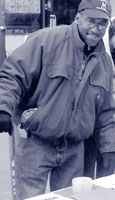Racism is a class issue!
Published Feb 17, 2005 9:39 PM
Following is a talk given by Julius Dykes, an African American auto
worker, at the Nov. 13-14, 2004, National Fightback
Conference.
One reason it is imperative to keep the struggle
against racism linked to the class struggle is that racism is, and has always
been, the main tool of division of the ruling class against the working class
and oppressed.
It affects the thinking of white workers as well as
workers of color. But the effect on Black workers and workers of color is to a
greater degree because we have been the direct victims of it.
The effects
on white workers are severe because it deforms their thinking and gives them a
distorted picture of themselves and people different from themselves. But
because the economics of racism and most social policies play in their favor,
some white workers learn to live with it or even deny that racism exists.
It affects workers in the Black community because it develops a
self-loathing and despair, which so-called Black-on-Black crime stems from. It
also develops sweeping hatred of white workers because through the ruling class
and their media manipulations we're led to believe that they are our
victimizers--when in fact the ruling class is the victimizer of the working
class as a whole.
Growing up as a young Black worker, this affected my
thinking for some time. I couldn't see past the direct racism and other harmful
social policies that were forced on me and the community I lived in.
I
knew I had to work for change, but didn't know quite what direction to
go.
I started attending meetings of organizations like the NAACP and the
Nation of Islam, which at the time was under the direction of Elijah Muhammad.
But as a worker, working with people of different colors every day,
listening to their experiences and seeing them go through some of the same
suffering and mistreatment that I was going through, the ideology of these two
organizations confused me.
So I decided to venture out further. I started
hanging out on the campus of Syracuse University and started talking to some of
the anti-war protesters and peace activists and some people that called
themselves socialists. And a lot of what they said made sense as far as the
working class and how we all are being exploited and victimized by the same
source. And around that time I had just read "The Autobiography of Malcolm X."
So all of this brought about more political clarity for me. I started
looking at things from a multinational, working-class perspective. And I went
through the rest of my years with this type of thinking. At the same time, I was
searching for the right organization.
And finally, when I read about
Workers World Party, the bright light came on. Because it had the same thinking
that I was carrying around with me, concerning the working class and how we're
all exploited, that what was used against us was our color and where we lived.
And WWP spoke out against that, against all reactionary policies against
working people--people of color, working-class whites, women, gay people,
disabled people.
And I said "This is it. I don't have to look any
further."
So we can see the many examples of divisiveness down through the
years that the tool of racism has caused, whether it was the Jim Crow laws that
kept Black people and white people separated, or the war on drugs that labeled
Black people as criminals, or this new war on terrorism that labels all Middle
Easterners as "terrorists."
It's the same racism that causes this thinking
and divisions in the working class. And many times it stifles the potential for
a strong multinational, progressive working-class movement.
That's why
it's so crucial that we fight racism and all the reactionary policies that
separate the working class.
Articles copyright 1995-2012 Workers World.
Verbatim copying and distribution of this entire article is permitted in any medium without royalty provided this notice is preserved.
Workers World, 55 W. 17 St., NY, NY 10011
Email:
[email protected]
Subscribe
[email protected]
Support independent news
DONATE


